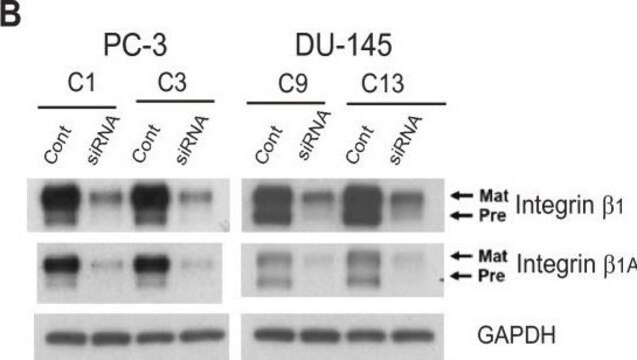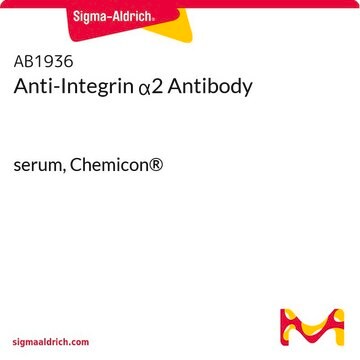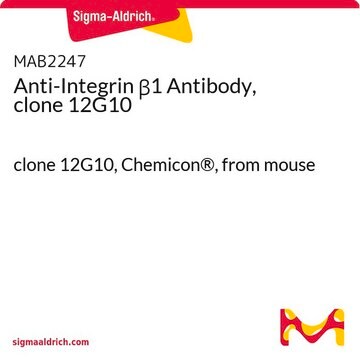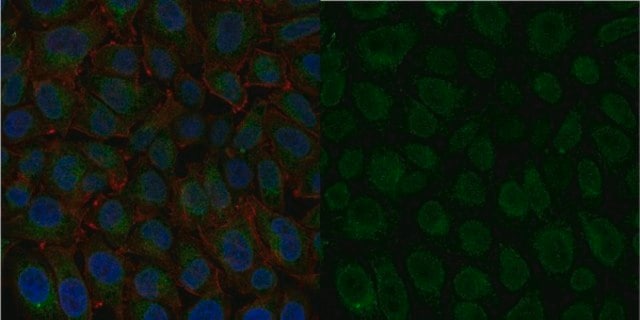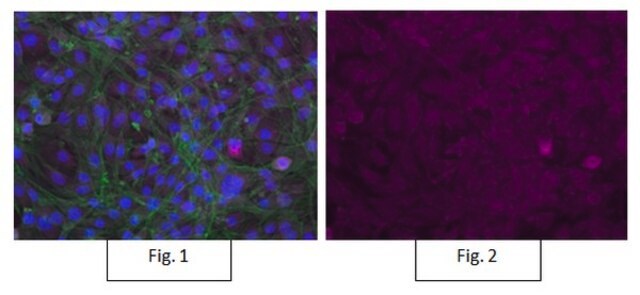AB1952
Anti-Integrin beta1 Antibody, Cytosolic
serum, Chemicon®
Synonym(s):
CD29
Sign Into View Organizational & Contract Pricing
All Photos(2)
About This Item
UNSPSC Code:
12352203
eCl@ss:
32160702
NACRES:
NA.41
Recommended Products
biological source
rabbit
Quality Level
antibody form
serum
antibody product type
primary antibodies
clone
polyclonal
species reactivity
mouse, rat, pig, human
manufacturer/tradename
Chemicon®
technique(s)
immunoprecipitation (IP): suitable
western blot: suitable
NCBI accession no.
UniProt accession no.
shipped in
dry ice
target post-translational modification
unmodified
Gene Information
human ... ITGB1(3688)
General description
Integrin beta 1, also known as CD29, is a 130 kDa transmembrane glycoprotein that forms noncovalent complexes with various Integrin alpha subunits (including alpha 1, alpha 2, alpha 3, alpha 4, alpha 5, and alpha 6) to form the functional receptors that bind to specific extracellular matrix proteins. Integrin receptors are involved in the regulation of a variety of important biological functions, including embryonic development, wound repair, hemostasis, and prevention of programmed cell death. They are also implicated in abnormal pathological states such as tumor directed angiogenesis, tumor cell growth, and metastasis. These heterodimeric receptors bridge the cytoplasmic actin cytoskeleton with proteins present in the extracellular matrix and/or on adjacent cells. Interactions between integrins and the extracellular matrix lead to activation of signal transduction pathways and regulation of gene expression.
Specificity
Reactive with human, mouse and rat integrin β-1, as confirmed by western blot. Not reactive with other integrins.
Immunogen
Epitope: C-terminus
Synthetic peptide corresponding to the c-terminal cytoplasmic domain of human β-1 integrin.
Application
Anti-Integrin beta1 Antibody, Cytosolic detects level of Integrin beta1 & has been published & validated for use in IP & WB.
Immunoprecipitation:
1 μL of antiserum per 25 μg total cell protein (in 40 μL). ) 0.5% triton X-100 lysis buffer with proteinase inhibitors is suggested.
Optimal working dilutions must be determined by end user.
1 μL of antiserum per 25 μg total cell protein (in 40 μL). ) 0.5% triton X-100 lysis buffer with proteinase inhibitors is suggested.
Optimal working dilutions must be determined by end user.
Research Category
Cell Structure
Cell Structure
Research Sub Category
Integrins
Integrins
Quality
Western Blot Analysis:
1:500 to 1:1000 dilution of this antibody was used for detection of integrin beta1 in whole cell lysate under non-reducing. Size of beta 1 integrin under non-reduced conditions is approximately 110 kDa; often a 220 kDa dimer is observed as well; beta -1 under reduced conditions runs as a 130kDa band with higher molecular weight aggregates as well.
1:500 to 1:1000 dilution of this antibody was used for detection of integrin beta1 in whole cell lysate under non-reducing. Size of beta 1 integrin under non-reduced conditions is approximately 110 kDa; often a 220 kDa dimer is observed as well; beta -1 under reduced conditions runs as a 130kDa band with higher molecular weight aggregates as well.
Target description
~130 kDa
Physical form
Rabbit polyclonal serum containing no preservatives
Unpurified
Storage and Stability
Stable for 1 year at -20ºC from date of receipt.
Analysis Note
Control
U251 cell line
U251 cell line
Other Notes
Concentration: Please refer to the Certificate of Analysis for the lot-specific concentration.
Legal Information
CHEMICON is a registered trademark of Merck KGaA, Darmstadt, Germany
Disclaimer
Unless otherwise stated in our catalog or other company documentation accompanying the product(s), our products are intended for research use only and are not to be used for any other purpose, which includes but is not limited to, unauthorized commercial uses, in vitro diagnostic uses, ex vivo or in vivo therapeutic uses or any type of consumption or application to humans or animals.
Not finding the right product?
Try our Product Selector Tool.
recommended
Product No.
Description
Pricing
Storage Class Code
10 - Combustible liquids
WGK
WGK 1
Certificates of Analysis (COA)
Search for Certificates of Analysis (COA) by entering the products Lot/Batch Number. Lot and Batch Numbers can be found on a product’s label following the words ‘Lot’ or ‘Batch’.
Already Own This Product?
Find documentation for the products that you have recently purchased in the Document Library.
Rab11 and its effector Rab coupling protein contribute to the trafficking of beta 1 integrins during axon growth in adult dorsal root ganglion neurons and PC12 cells.
Eva, R; Dassie, E; Caswell, PT; Dick, G; ffrench-Constant, C; Norman, JC; Fawcett, JW
The Journal of Neuroscience null
Evgeny A Zemskov et al.
PloS one, 6(4), e19414-e19414 (2011-05-11)
Although endosomal compartments have been suggested to play a role in unconventional protein secretion, there is scarce experimental evidence for such involvement. Here we report that recycling endosomes are essential for externalization of cytoplasmic secretory protein tissue transglutaminase (tTG). The
Iwona Majkowska et al.
The Journal of biological chemistry, 292(16), 6633-6643 (2017-03-09)
Membrane-type 1 matrix metalloproteinase (MT1-MMP) is a membrane-bound MMP that is highly expressed in cells with invading capacity, including fibroblasts and invasive cancer cells. However, pathways of MT1-MMP up-regulation are not clearly understood. A potential physiological stimulus for MT1-MMP expression
Regulation of ectoplasmic specialization dynamics in the seminiferous epithelium by focal adhesion-associated proteins in testosterone-suppressed rat testes.
Wong, CH; Xia, W; Lee, NP; Mruk, DD; Lee, WM; Cheng, CY
Endocrinology null
Nicklas Heine Staunstrup et al.
Disease models & mechanisms, 10(7), 869-880 (2017-07-07)
Psoriasis is a complex human-specific disease characterized by perturbed keratinocyte proliferation and a pro-inflammatory environment in the skin. Porcine skin architecture and immunity are very similar to that in humans, rendering the pig a suitable animal model for studying the
Our team of scientists has experience in all areas of research including Life Science, Material Science, Chemical Synthesis, Chromatography, Analytical and many others.
Contact Technical Service
